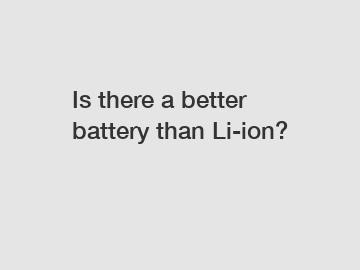Is there a better battery than Li-ion?
CAMEL supply professional and honest service.
Is there a better battery than Li-ion?
In today's world where electronic devices have become an integral part of our lives, battery technology plays a crucial role in ensuring their smooth operation. Lithium-ion (Li-ion) batteries have been the go-to choice for many years due to their high energy density and longer lifespan compared to previous battery technologies. However, researchers and scientists have been constantly seeking alternatives that can offer even better performance, improved safety, and higher sustainability. In this article, we will explore whether there is a better battery technology than Li-ion and discuss some contenders in the market.

Nickel-Metal Hydride (NiMH) Batteries.
One of the most well-known alternatives to Li-ion batteries is Nickel-Metal Hydride (NiMH) batteries. These batteries have been used in various applications, including consumer electronics and hybrid vehicles. NiMH batteries offer a higher energy density and longer lifespan compared to traditional nickel-cadmium batteries without the toxic effects of cadmium. However, they still fall short in terms of energy density when compared to Li-ion batteries, making them less suitable for high-performance devices.
Solid-State Batteries.
Solid-state batteries have gained significant attention in recent years as a potential successor to Li-ion batteries. These batteries use solid electrolytes instead of liquid or gel-based electrolytes found in Li-ion batteries. Solid-state batteries offer several advantages, including higher energy density, longer lifespan, faster charging times, and improved safety. Additionally, they eliminate the risk of leakage or thermal runaway associated with Li-ion batteries. Although solid-state batteries show great promise, there are still challenges in scaling up production and reducing costs before they become commercially viable.
Lithium-Sulfur (Li-S) Batteries.
Lithium-Sulfur (Li-S) batteries have also emerged as a potential alternative to Li-ion batteries. They offer a much higher theoretical energy density than Li-ion batteries, making them attractive for applications that require longer battery life. Li-S batteries use sulfur as the cathode material and lithium as the anode material. However, there are several challenges associated with Li-S batteries, including sulfur loss and the formation of lithium dendrites, which can limit their cycling life. Researchers are actively working on overcoming these challenges to make Li-S batteries a commercially viable option.
Graphene-Based Batteries.
Graphene, a single layer of carbon atoms arranged in a hexagonal lattice, has revolutionized various industries with its exceptional properties. Graphene-based batteries have shown great potential in terms of energy storage due to their high conductivity, large surface area, and flexibility. These batteries offer higher energy density, faster charging times, and longer lifespan compared to Li-ion batteries. However, the high cost of graphene production and challenges in large-scale manufacturing are hindering their widespread adoption.
Conclusion.
While Li-ion batteries have been the dominant technology for portable electronic devices for many years, the search for a better battery technology continues. Several alternatives, such as NiMH batteries, solid-state batteries, Li-S batteries, and graphene-based batteries, have shown promise in terms of improved performance, safety, and sustainability. However, each of these technologies still faces challenges that need to be addressed before they can replace Li-ion batteries entirely.
As researchers and scientists continue to innovate in the battery industry, we can expect breakthroughs that will shape the future of energy storage. Until then, Li-ion batteries remain the most practical and widely available option for consumers. However, it is crucial to stay updated with the latest advancements in battery technology to make informed choices about our energy needs.
For more information on battery technologies and to explore the latest developments, feel free to contact us. Our team of experts is dedicated to providing you with the most up-to-date information and solutions regarding energy storage.
If you want to learn more, please visit our website.
If you are looking for more details, kindly visit h4 agm.



